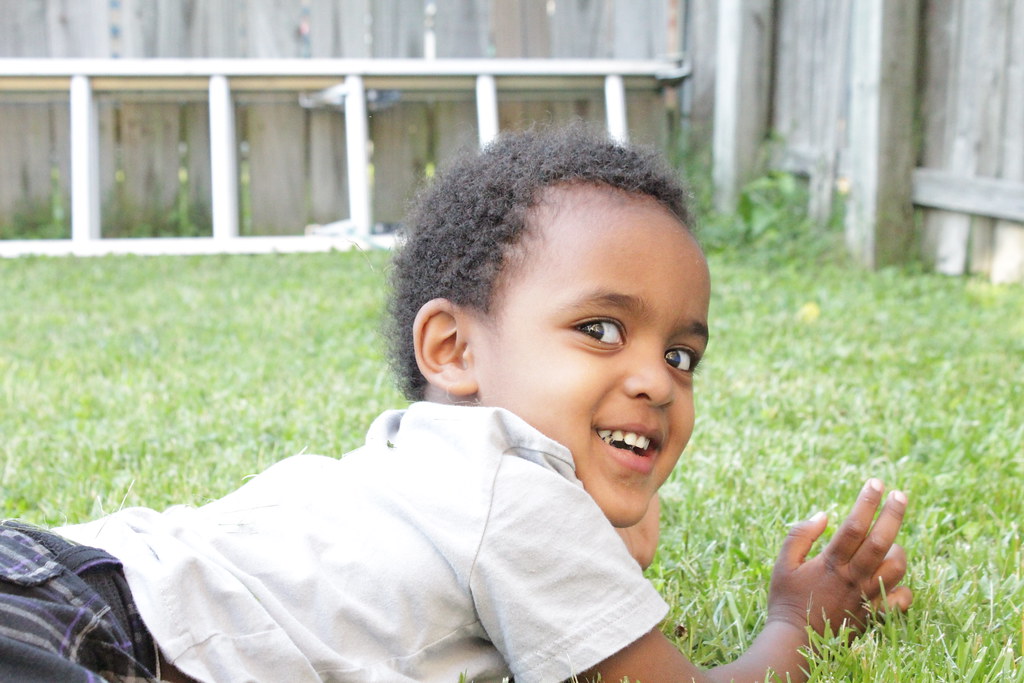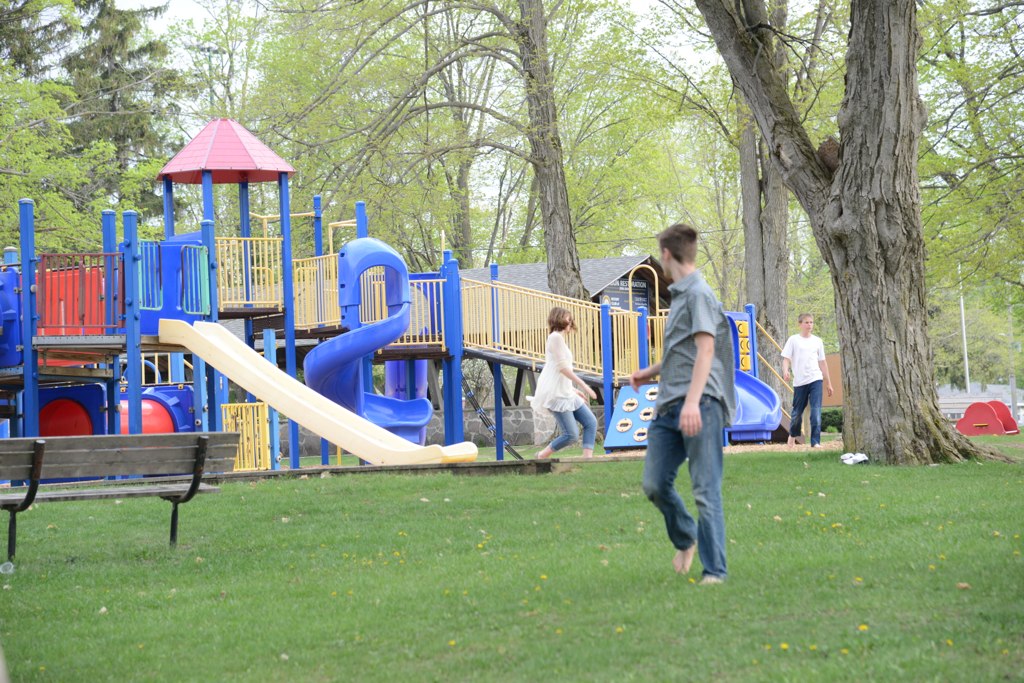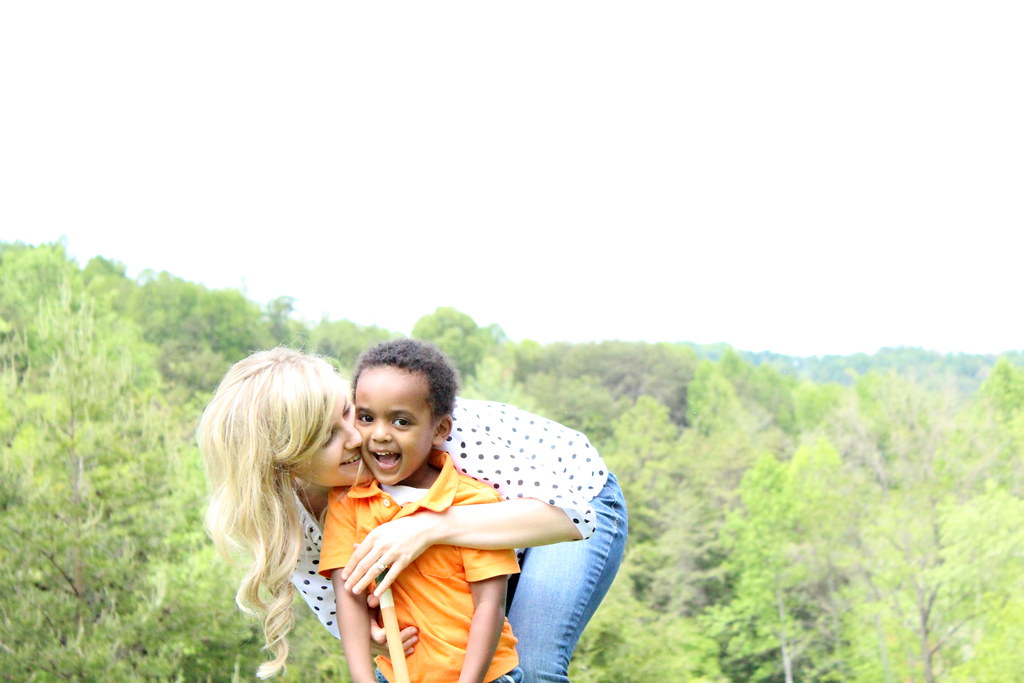So, for Lauren Casper, living with her five-year-old autistic son, Mareto, is a lot like playing the telephone game. He blurts out little phrases that have their origin in something he saw or heard, but by the time they make their way through his mind and back out of his mouth they’ve transformed—often into beautiful truths about living a simple, authentic, love- and joy-filled life. It’s a grace to welcome Lauren to the farm’s front porch…
Their laughter kinda pierced the air and cut straight to my heart.
It was the sound of several girls, about eight or nine years old, making fun of a little boy.
My little boy.
The Mama Bear inside of me began to growl, and I glared darts right at that group of laughing girls. It didn’t much matter since they weren’t looking in my direction.
They were focused on Mareto, who had noticed the girls and become curious. He’d run to play closer attention to them, but he had gotten distracted by the mulch on the ground and bent to pick it up.
As he reached out his shirt rode up his back, and the top of his diaper peeked out above the waistband of his shorts. The girls noticed.
Their laughter was only interrupted by their even louder exclamations to each other. “Look! That kid is wearing a diaper!”
I was furious.
Mareto heard their laughter and didn’t understand it was at his expense, so he popped his head up and smiled. Then he took a few steps toward the girls, stood before them tall and happy, and said, “Hi, I Nato!”
I stayed in the background watching the exchange.







The girls grew quiet and curious.
They watched him — and then noticed me.
They smiled a few times, tried to understand his excited chatter, and then eventually moved on to play a game of hide-and-seek. Mareto was content to dig in the mulch and play on the slide with his sister.
I’ve thought a lot about that exchange, about Mareto’s brave response and how it immediately shut down the girls’ teasing.
I’ve thought about his innocence and sweetness and how relieved I was that he didn’t know they were making fun of him.
And I’ve thought a lot about their reaction . . . and mine.
My first response was protective anger—natural for a mother, I suppose.
I was ripping those girls a new one in my head and hoping they caught my glares. But I know how girls are at that age because I was one once myself. A parent’s scolding would have only made them angry, and they would have walked away to continue their teasing in private—their words growing harsher as they made each other laugh.
But when Mareto simply introduced himself with kindness and a smile, the girls were baffled.
It was clearly not what they expected, and the element of surprise led to curiosity. Their mean laughter transformed into confused but genuine smiles of interest.
I could tell they knew Mareto was different, and that they felt a little guilty when they eventually walked away. But I could also tell they sort of liked him. That’s what love does in the face of cruelty. It surprises, confuses, and then teaches.
Mareto’s innocence makes him incredibly brave and loving, and the differences between him and other children give him endless opportunities to display that love. Mareto always assumes the best of others and doesn’t expect to be hurt. I want to be more like Mareto.
I still cried later that night after I tucked Mareto into bed, but somehow I knew he was going to be okay. The world might not always be kind to him, but he would be kind to the world . . . and teach everyone what love looks like.
My first instinct in the face of meanness isn’t love; it’s self-defense.
And sometimes self-defense looks a bit like hurting someone else the way they’ve hurt us, doesn’t it?
The process always entails someone hurting me, me hurting them, and both of us walking away angry, resentful, bitter, and maybe a bit ashamed.
When the harried mother accidentally cuts us off in traffic because she’s late to the doctor, we honk and wave our arms in frustration. Maybe she rushes into the doctor’s office feeling mad because some jerk on the road honked and yelled at her, so when the secretary tells her that the appointments are running about forty-five minutes behind, this mom sits in the waiting room, steaming. When she finally gets to see the doctor, she’s angry and lets him know.
An hour later the frustrated doctor walks into a room and isn’t as kind and gentle and compassionate as he should be when he delivers a crushing diagnosis to the parents waiting with fear in their eyes.
Do you see the cycle? Hurt keeps on filtering through everyone until someone stops it.
Someone has to be brave enough, or innocent enough, to swallow his or her pride and respond in love.
Love changes the trajectory of life.
I believe this is what Jesus was talking about when He said that the greatest commandment of all is to love God with all our heart, soul, and mind, and the second greatest commandment is to love everyone around us as much as we love ourselves. He finished by saying that everything—the law and all the prophets—hinges on us loving God and loving each other.
The world is held together by love. And if that’s true, then the opposite is also true: The world falls apart when we don’t love God and each other.
This is why love wins.
We don’t have to know someone’s story to love them well. It should be enough to remember that they have a story, just as we do.
Hurt people hurt people.
And we’re all hurting.
Hurt keeps on filtering through everyone until someone stops it.
There’s only one answer that can break the cycle: love.
Love holds us together, heals wounds, restores relationships, and changes things.
The whole world hinges on us responding in love.
Lauren Casper is the author of It’s Okay About It: Lessons From A Remarkable Five-Year-Old About Living Life Wide Open. She is a top contributor to the TODAY Parenting Team and has had numerous articles syndicated by The Huffington Post, the TODAY show, Yahoo! News, and several other publications. She also has the joy of serving on the Created for Care team, a nonprofit ministry dedicated to serving foster and adoptive families. Lauren and her husband, John, have two beautiful children adopted from Ethiopia.Mareto has a number of scripted phrases he says over and over. They seem silly at first, but as Casper has thought about them over time, she’s realized he is actually sharing important life lessons. From “it’s okay about it,” a simple reminder that even when things are painful or difficult, things will be okay because of the God who promises never to leave or forsake his children, to “you’re making me feelings,” which teaches the importance of leaning into one’s emotions and, in doing so, sharing a piece of oneself with loved ones—Mareto’s simple yet profound wisdom is a reminder to embrace the broken beauty of life, to believe in a God bigger than human comprehension, to love others even when it doesn’t make sense, and to find joy in unexpected places. For all those looking to recapture the faith, simplicity, wonder, hope, courage, and joy of life, It’s Okay About It provides a guide to look inward and live outward, to discover the most wide open and beautiful life possible.
[ Our humble thanks to Thomas Nelson for their partnership in today’s devotion ]








